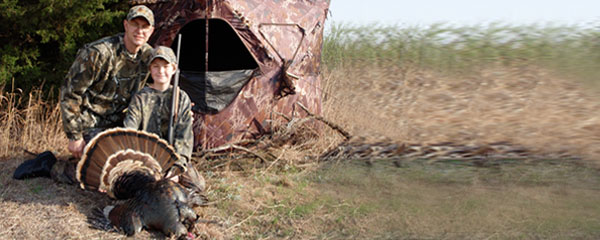an. 24, 2013
Special hunts program gives hunters access to land not normally open to the public
PRATT – Since its inception nearly 20 years ago, hunters have been able to apply for exclusive entry into areas with limited access through the Kansas Department of Wildlife, Parks and Tourism (KDWPT) Special Hunts Program. This special access means a higher quality hunt and potentially greater harvest rates, but hunters should still make every preparation necessary to ensure a successful hunt, just as they would anywhere else.
"The only guarantee with Special Hunts is you'll have a place to hunt,” said Mike Nyhoff, KDWPT Public Lands regional supervisor. “These are wild animals with real Kansas weather and topography affecting the critters and hunters alike. We don't guarantee success harvesting game, that's still up to the hunter."
When the Special Hunts Program first began in the early 1990s, hunters were permitted access to lands not normally open to public hunting such as refuges and state parks. Past special hunts have taken place on wildlife areas, state parks, Corps of Engineers properties, national wildlife refuges and city and county parks. In 2009, the amount of land available for special hunts increased as private landowners became eligible to participate in the program. To date, hunters have access to exclusive hunting areas in 13 counties statewide.
Although similar to the Walk-In Hunting Access (WIHA) program in that private landowners are compensated for the use of their land, the Special Hunts Program allows landowners to exercise more control over the use of their land. Rules such as which dates hunting can occur, how many people can hunt, as well as what species can be hunted are all left to the landowners’ discretion. In addition, land areas designated for special hunts provide limited access to the public, whereas WIHAs provide open access to hunters.
Because access is limited, hunters must apply online for the hunts they desire. Interested applicants can expect to see more information on the 2013 fall and winter special hunts in early July. In 2012, the Special Hunts Program made 646 hunts available for the fall/winter hunting season. Hunters had a choice of upland birds and doves, ducks and geese, deer, turkey and furbearers.
In addition to what type of species applicants would like to hunt, hunters must also specify if they are requesting an open hunt, a youth hunt, or a mentor hunt.
• Open hunts are available to all hunters.
• Youth hunts require parties to include at least one youth 18 or younger, accompanied by an adult 21 or older. The adult cannot hunt.
• Mentor hunts are open to both youth and novice hunters supervised by a mentor 21 or older. Both beginning hunter and mentor can hunt. A youth is a person 18 or younger, whereas a novice is a youth 18 or younger, or any person who has never possessed a hunting license prior to the special hunt.
Depending upon the location and species being hunted, special hunts can range from a half-day up to the entire length of the season. Upon successfully completing the application, hunters will then be entered into a random computer drawing conducted within one week of the application deadline. If chosen, the successful applicant will then be emailed their hunt permit, as well as maps and other information.
For the spring turkey season, hunters will be able to apply for special hunts from Feb. 1-March 11. Last year, the Special Hunts Program made approximately 170 hunts available at 27 different locations. A similar number of hunts are expected for the 2013 season, which is youth/disabled/archery, April 1-9, followed by the regular firearm season, April 10-May 31.
“If we can provide one quality experience a year for a hunter, beginner or expert,” said Bruce Taggart, retired KDWPT employee and fundamental party in initiating the Special Hunts Program, “chances are they will continue in the sport for years to come.”
For more information on the Special Hunts Program, visit www.ksoutdoors.com and click “Hunting/Special Hunts Information.”



No comments:
Post a Comment